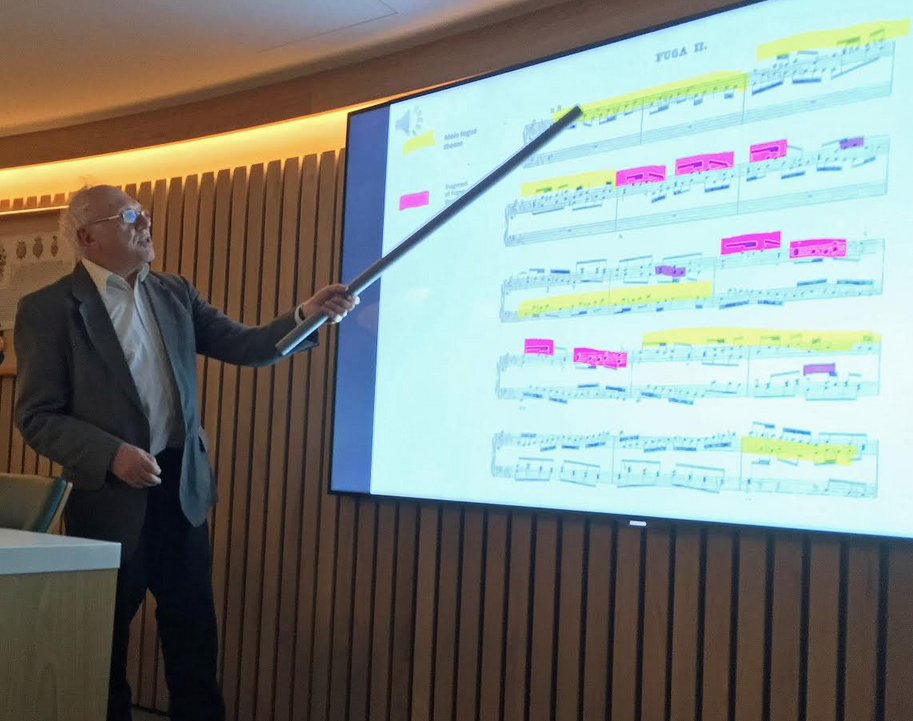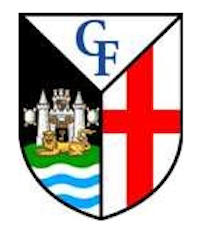 Abraham Lincoln
If given the truth, the people can be depended upon to meet any national crisis...
Abraham Lincoln
If given the truth, the people can be depended upon to meet any national crisis...
 Guildford news...
for Guildford people, brought to you by Guildford reporters - Guildford's own news service
Guildford news...
for Guildford people, brought to you by Guildford reporters - Guildford's own news service
Feature: What is German About German Music?
Published on: 27 Jul, 2018
Updated on: 27 Jul, 2018

Levi displayed the written score on the video screen and literally pointed out to us, as the music played, which element did what.
By Barbara Ford
The chair of the Guildford Twinning Association(formerly the Guildford Freiburg Association) reports on a lecture that examined the characteristics of German music…
Has German music really got a German character?
Richard Wagner attempted to answer this question in the nineteenth century. This year (2018), in the spring, Guildford resident and distinguished musicologist Professor Erik Levi had another crack at it, in a public lecture he gave to a capacity audience in the Council Chamber of Guildford Borough Council, for the Guildford Twinning Association.
Professor Levi started by highlighting how the notion of Austro-German leadership in musical developments has prevailed over the past few centuries and dominated our classical music repertoires.
Works by composers from other countries are implicitly measured against universally accepted notions of German music. This has been reinforced by the primacy of “the three Bs” – Bach, Beethoven and Brahms.
He then showed how the link between German music and German-ness and German identity was only occasionally made by the composers themselves. It was almost always made by those writing about the music – writers, thinkers, politicians, educators, commercial interests.
Starting in the late 18th century when Germany was still a disparate collection of small states, German music came to be treated as a national German inheritance, supporting the notion of a German identity and the political movement towards unification in 1870.
It was later used overtly for political ends, notably by the Nazis: for example, Nazi propaganda minister Joseph Goebbels exploited the 1941 Mozart anniversary to serve the war effort, claiming Mozart’s music as “part of what our soldiers are defending against Eastern barbarism”.
Professor Levi went on to consider whether German music evidences a specific national character, and if so can we define it? These were the characteristics he suggested answered the question:
- The depth, hard work and thoroughness (Tiefsinn, Arbeit, Gründlichkeit) of German music, qualities that are less pervasive in the music of other countries.
- German music generally favours intellect over sensuality, harmony over melody, metaphysical over physical, organic over mechanical, development over sequence, ideas over entertainment.
- German music is both universal and synthetic, it fuses elements of other musical cultures (such as French and Italian) into something homogeneous. Form and expression are unified, as are the horizontal and vertical in musical writing.
He then demonstrated how these characteristics are evidenced technically, by way of recorded extracts from works of the three Bs: a Bach fugue, Beethoven’s variations on a duet from Mozart’s Die Zauberflöte (The Magic Flute) and Brahms’ Symphony no 2.
Levi displayed the written score on the video screen and literally pointed out to us, as the music played, which element did what. This was an eye-opening, or ear-opening, revelation to the non-musical members of the audience (those of us who “know what we like” but not much more than that).
 You can find Professor Levi’s slide deck and the three musical examples on the Guildford Twinning Association’s website here (click on the loudspeaker icons to hear the music).
You can find Professor Levi’s slide deck and the three musical examples on the Guildford Twinning Association’s website here (click on the loudspeaker icons to hear the music).
Erik Levi is Visiting Professor at Royal Holloway, University of London. He is a worldwide authority and writer on German music of the 20th century especially that of the Nazi era.
In addition, he is a pianist and a music journalist: he has been writing articles and reviewing CDs for the BBC Music Magazine since the 1990s, and is a frequent broadcaster for BBC Radio 3. You can catch his next broadcast talk in September for the Proms.
The Guildford Twinning Association (formerly the Guildford-Freiburg Association) is a voluntary organisation supporting the twinning of Guildford and Freiburg. For more information, and how to join, see: guildfordtwinning.uk.
Recent Articles
- Burglar Jailed Thanks To Quick Action of Ash Resident
- Highways Bulletin for December
- Birdwatcher’s Diary No.318 Some Pre-Christmas Rambles
- Merry Christmas and a Happy New Year to All Our Contributors and Readers!
- More Units Added to Solums’s Station Redevelopment
- Vehicle Stop on Epsom Road Leads to Prolific Drug Gang Being Put Behind Bars
- Local Political Leaders Respond to Publication of the English Devolution White Paper
- Flashback: Guildford All Lit Up For Christmas – Then And Now
- City Earn Themselves a Three Point Christmas Present
- Mayor’s Diary: December 23 – January 4


Search in Site
Media Gallery
Dragon Interview: Local Artist Leaves Her Mark At One of England’s Most Historic Buildings
January 21, 2023 / No Comment / Read MoreDragon Interview: Lib Dem Planning Chair: ‘Current Policy Doesn’t Work for Local People’
January 19, 2023 / No Comment / Read MoreA3 Tunnel in Guildford ‘Necessary’ for New Homes, Says Guildford’s MP
January 10, 2023 / No Comment / Read More‘Madness’ for London Road Scheme to Go Ahead Against ‘Huge Opposition’, Says SCC Leader
January 6, 2023 / No Comment / Read MoreCouncillor’s Son Starts Campaign for More Consultation on North Street Plan
December 30, 2022 / No Comment / Read MoreCounty Council Climbs Down Over London Road Works – Further ‘Engagement’ Period Announced
December 14, 2022 / No Comment / Read MoreDragon Interview: GBC Reaction to the Government’s Expected Decision to Relax Housing Targets
December 7, 2022 / No Comment / Read MoreHow Can Our Town Centre Businesses Recover? Watch the Shop Front Debate
May 18, 2020 / No Comment / Read More













Recent Comments